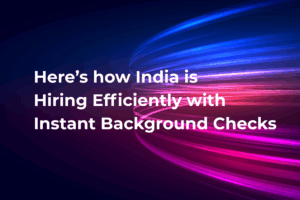Global Capability Centres (GCCs) are the sophisticated, fully owned offshore hubs powering innovation, product development, and operational excellence for multinational giants. For them, the pressure to scale talent rapidly often collides headfirst with the unforgiving terrain of compliance risk. When onboarding dozens or hundreds of new employees across BFSI, healthcare, IT, and customer support, even one unvetted hire can trigger a chain reaction of risks. When dealing with global operations and intellectual property, one cannot afford to ignore global background screening services because you can choose both scale and compliance.
And as hiring footprints stretch across Tier 2 and Tier 3 cities and even across borders, the complexity of verification increases exponentially. However, a background screening company that leverages automation and ethical AI can simplify these complexities at scale to verify employment history, validate identity, spot credential fraud, and flag potential legal or ethical risks.
From manipulated employment letters to fake degrees and deepfake interviews, employment fraud has evolved, and it’s easy to miss high-volume hiring sprints. That’s where tech-enabled employment background services ensure fast hiring doesn’t compromise organizational integrity. GCCs must partner with global screening solution providers to build a legally sound hiring pipeline that handles digital identity, cross-border documentation, and consent management.
The Compliance Trap in Rapid Hiring
For GCCs racing to meet hiring targets, it’s easy to assume speed equals success. But under pressure, skipping or minimizing background checks can mean hiring someone with fake credentials, undisclosed criminal history, or dual employment. You might expose customer data, compromise financial controls, or violate labor laws across geographies.
The cost of neglect is measurable and growing. A firm in India was fined $47,881 for a 458-day delay in appointing a company secretary, showing how administrative lapses can snowball into big violations. In Canada, over 400 companies were penalized for non-compliance while hiring temporary foreign workers. In another case, a government agency in Canada fined employers $2.1 million for breaking Temporary Foreign Worker Program (TFWP) rules between April 2023 and March 2024.
This is where global background screening services can help GCCs standardize pre-employment verification across roles and geographies, regardless of hiring volume. From criminal record checks and education validation to drug testing and moonlighting audits, modern screening tools detect even subtle patterns of inconsistency.
Key Regulatory Areas to Watch
• Data Privacy Laws
As GCCs expand their global hiring footprint, they inherit something far more complex than time zone juggling. A candidate’s personal information, like tax IDs, education records, and criminal checks, must be processed lawfully across borders.
While most regions don’t have background check specific laws, nearly all fall under broader privacy
regimes:
– GDPR in Europe
– CCPA in California
– LGPD in Brazil
– PDPA in Singapore
– DPDPA in India
Many of these frameworks emphasize the purpose limitation principle that states you may collect only what’s necessary, for as long as it’s necessary, and with explicit consent or legal justification. This has direct implications for employment background services. A one-size-fits-all screening process won’t survive scrutiny.
• Sector-specific Regulations
Global screening solutions providers must also account for industry obligations.
BFSI & Fintech – Background checks often require financial fraud screening, Anti-Money Laundering (AML) validation, and credit history vetting, where legally allowed.
Healthcare & Pharma – The sector is regulated by HIPAA (US), MDR (EU), and equivalents elsewhere. Verifying credentials, medical licenses, and ethical compliance histories is mandatory for many roles.
Telecom & IT Infrastructure – Security clearance checks and data access evaluations are often required due to the sensitive nature of systems and how user data is handled.
Manufacturing & Engineering – Safety compliance, drug testing (in jurisdictions where permitted), and OSHA-related background reviews come into play.
Consulting & Analytics – Client-facing roles often require additional background screening clauses embedded in contracts, which may demand third-party attestation of past employment and project history.
• Creating a Verification Process That Scales
A scalable verification process starts with legally aware automation. A good system should verify identities via biometric or document authentication, aggregate data from public records and criminal databases, and sync with your ATS. Most importantly, it must log every action into an audit trail so you can prove fair and lawful processing when the regulators come knocking.
That’s especially important in jurisdictions that tighten AI oversight. The EU’s AI Act, NYC’s AEDT law, India’s MeitY advisories, and others now require transparency in algorithmic decision-making. A background screening company offering global background screening services should also support explainable AI that shows why a decision was made and allows regular bias audits using diverse training data.
• Benefits Beyond Compliance: Quality of Hire and Reputation Management
Better screening leads to better people, and better people make everything work. Employment background services eliminate red flags and accentuate talent baseline. When high-performing employees are consistently vetted and hired, retention improves, productivity climbs, and internal mobility becomes more organic. Over time, this creates a workforce that sustains momentum rather than constantly rebuilding it. A bad hire in a client-facing or high-risk role can cost you partnerships, public trust, and legal stability. Besides headcount and metrics, global screening solutions offer a less tangible but more enduring benefit, which is a high reputation.
• How cFIRST Supports Scalable, Compliant Hiring
– Modular Service Offerings
You can tailor background verifications by role, region, or risk level, combining services like psychometric testing, SSN tracing, directorship checks, or drug screening into bespoke bundles. This is crucial for companies expanding globally or with changing hiring needs.
– Regulatory Expertise Across Jurisdictions
Compliance is a moving target that varies widely across states and countries. As a global background screening service provider, cFIRST builds jurisdiction-specific compliance into its process architecture. US hires receive FCRA-compliant reports, while EU candidates are screened under GDPR and local labor laws. And in India, checks align with IT Act guidelines. Our systems reduce regulatory risk and maintain transparency for all legal, operational, and executive stakeholders.
Conclusion
As GCCs rush to scale across time zones, talent markets, and regulatory landscapes, they must make sure their foundation can stretch without breaking. A compliant hiring process, anchored in rigorous background checks, is what keeps your operational risk in check as your ambitions grow. The right employment background services with regulatory fluency can help GCCs avoid the trap of scaling teams without scaling defense against vulnerability.








